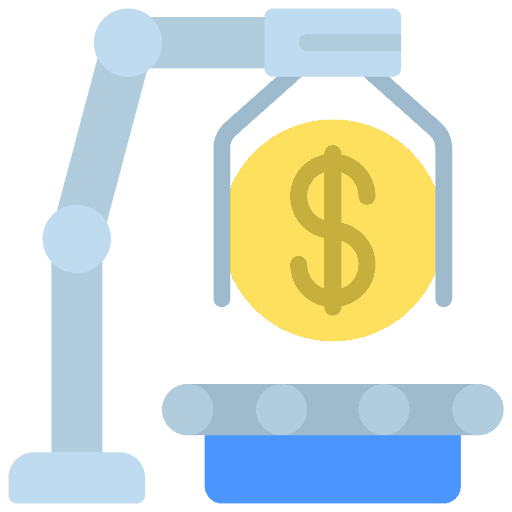AI in Sales Statistics 2023 [Adoption, Benefits, Market Size]
Although artificial intelligence may seem to be a recent development in the business world, it has already had a significant impact on the way that business-to-business (B2B) sales are conducted.
Businesses that adopted AI have seen considerable advantages, including increases in productivity and revenue, as well as reductions in costs, and improvements in customer experiences and other areas.
But what exactly does artificial intelligence do in sales? And how can you put that information to use to drive sales?
In this article, we present the latest statistics we gathered for you about the use of AI in sales.
- , AI

Top AI in Sales Statistics
- In order to enhance internal operations and client experiences, 57% of the most successful sales firms employ AI.
- The main growth area for sales is the adoption of AI, which is increased by 139% by 2022.
- The efficiency of sales reps is increased by at least 27% when administrative and time-consuming duties are automated.
- A 60%-70% decrease and a 40%-60% reduce costs in call time were seen by businesses employing AI for sales.
- Marketing and sales techniques that use AI and other types of analytics could access $2.6 trillion in value every year.
- Lead generation increased by up to 50% using AI algorithms.
- According to 79% of the organizations surveyed, AI has helped their marketing and sales teams generate revenue by a minimum of 5%.
- 87% of those who have used AI want to use it further to enhance email marketing and provide precise sales projections.
- Just a tiny portion of marketers—17%—plan to employ AI in their marketing, compared to almost half of businesses (61%) that want to include it in their sales forecast.
Market Size of AI in Sales
The worldwide market for sales intelligence, which was previously anticipated to be worth US$2. 6 billion in 2020 but has now been updated to US$5. 4 billion by 2027, is expected to rise at a CAGR of 11 (Globe Newswire)
In the United States, the market for sales intelligence is anticipated to reach US$703.9 million in 2020. It is anticipated that China, the world’s second-biggest economy, will have a market size of $1.2 billion by the year 2027, with a compound annual growth rate (CAGR) of 14.4% for the period of study spanning the years 2020 to 2027.
Japan and Canada are two more notable international markets, with growth rates of 7.7% and 9.6% for the period of 2020–2027, respectively. Whereas, Germany is expected to have grown within Europe at a CAGR of around 8.7%.
Impact of AI on Sales
Companies are using artificial intelligence (AI) to increase lead volume, raise closure rates, and significantly enhance total sales productivity. This is so that a large portion of the sales cycle can be automated and enhanced by this technology. Sales representatives can now freely concentrate on what really matters: making the sale.
Businesses utilizing AI for sales were able to enhance their lead generation by more than 50%, decrease call times by 60–70%, and reduce costs by 40–60% (Harvard Business Review)
Research that was published in the Harvard Business Review indicated that businesses that used AI for sales were able to obtain cost savings of between 40 and 60 percent, an increase in leads of more than 50 percent, and a decrease in call time of between 60 and 70 percent.
Where is AI used in Sales?
Actually, AI has the power to make everything smarter, from advertisements to content. As a consequence, highly developed AI is capable of analyzing customer and prospective data, identifying the prospects who are most likely to convert, advising on the most crucial sales steps to take, forecasting outcomes, price optimization, and a plethora of other tasks.
Almost one-fourth of sales teams presently employ AI in their daily operations (Salesforce)
Aside from customer support, several firms’ sales sectors use artificial intelligence in their daily operations. AI is being embraced by the sales force the fastest of any other technology.
The marketing and sales sector places 40% more emphasis on AI and ML for market revenue performance than the rest of the sectors (Forbes)
Because of this, AI marketing businesses, customer support roles, and sales teams depend on process automation in order to enhance their market revenue share.
A growing number of B2B marketers—64% as of now—view AI as beneficial to their sales or strategy (Momentum Data)
If one examines enterprises as a whole, 83% see AI as a top priority for their current strategy.
It is clear that sales representatives need to start adjusting their abilities to these developments as a result of this rising belief and the greater emphasis on integrating AI into corporate operations, either in sales or marketing.
This is shown by the fact that 36% of CEOs think that the main objective of AI is to free up people’ creativity in their work by automating tedious chores.
How is Artificial Intelligence Transforming Sales?
According to studies, salespeople spend roughly 34% of their time actually closing deals. This issue is resolved with AI for sales, which automates routine, repetitive office duties. Salespeople now have more time to devote to their duties.
This entails fostering connections and offering prospective answers to their concerns. AI for sales is leveling up the whole process in addition to making it simpler to close deals. from basic touches, automatic lead follow-ups, and live interaction.
AI can help sales by automating labor-intensive processes, reclaiming sales representatives’ time, and increasing their productivity by at least 27% (People.ai)
Other ways that AI may assist in sales include:
- Reduce the use of manual data input and promote the use of Customer Relationship Management systems
- Permit sales coaches to establish precise objectives and monitor representatives’ activity levels and advancement
- By offering real-time pipeline analysis to promote predictive forecasting
61% of all respondents claimed to be using or planning to utilize AI for sales forecasting (Statista)
The graph below depicts the proportion of businesses that have adopted or intend to implement certain AI use cases in 2017. Sixty-one percent of participants indicated they either utilized AI for sales forecasting now or planned to do so in the future.
87 percent of individuals that were currently using AI for adoption reasons stated they were using or contemplating utilizing AI for sales forecasting.

| Share of respondents using or planning to | ||
| Categories | All Respondents | Current AI Adopters |
| Sales and marketing lead scoring | 66% | 83% |
| Sales opportunity scoring | 63% | 80% |
| Sales forecasting | 61% | 87% |
| Customer service case classification/routing | 59% | 83% |
| Chatbots for customer service or product selection | 47% | 75% |
| Cross-selling and upselling | 51% | 68% |
| Fraud detection | 57% | 64% |
| Credit risk scoring | 55% | 61% |
| Email marketing | 74% | 87% |
Benefits of AI in Sales
According to 79% of survey participants, the use of AI in marketing and sales has boosted company profits (McKinsey)
AI can make marketing and sales teams more effective and help them complete more contracts by automating monotonous operations and analyzing client data. Machine learning methods may also be utilized for customer behavior predictions, sales planning, and finding useful insights.
56% of customers actively seek out deals with businesses they believe to be the most innovative (Salesforce)
Yes, buyers commend businesses that include AI in their company descriptions in an effort to attract more leads or investments.
However, applying AI to genuine use cases inside your business that are evident in the interactions you have with leads throughout sales might result in a huge acceleration of growth.
Future of Artificial Intelligence in Sales
By the year 2025, 75% of B2B sales organizations will use a combination of artificial intelligence and traditional sales solutions (Gartner)
Gartner’s research from the previous year showed that B2B companies are already adjusting to the requirement for hybrid AI selling solutions. Many of the regular components of ABM and B2B sales may be handled by AI. It also offers practical advice for salespeople who make the human connection necessary to follow up with or make a sale to a properly nurtured lead.
Eighty-seven percent of currently AI-using companies want to use AI for sales forecasting in the future (Techsur)
Techsur estimates that approximately 90% of companies using AI have dedicated systems in place to utilize it for predicting sales. One of the early commercial uses of AI was sales-trend forecasting or anticipating which items would need greater stock before seasonal periods and holidays.
AI in Sales Statistics Final Words
So, these are the latest AI in sales stats and a few real-world examples of how artificial intelligence is becoming more prevalent in the context of sales. Don’t panic, salesman; although these statistics may not indicate that you will soon be replaced by a robot, they may indicate that your department has to make some changes in order to keep up with the singularity’s progress.
References
- 10 artificial intelligence statistics you need to know in 2022 [Infographic]. (2022, March 14). Oberlo | Where Self Made is Made. https://www.oberlo.com/blog/artificial-intelligence-statistics
- The state of AI in 2021. (n.d.). McKinsey & Company. https://www.mckinsey.com/capabilities/quantumblack/our-insights/global-survey-the-state-of-ai-in-2021
- 26 sales statistics that prove sales is changing. (2017, November 15). Salesforce Blog. https://www.salesforce.com/content/blogs/us/en/2017/11/15-sales-statistics.html?bc=OTH
- Gartner predicts 75% of B2B sales organizations will augment traditional sales playbooks with AI-guided selling solutions by 2025. (n.d.). Gartner. https://www.gartner.com/en/newsroom/press-releases/gartner-predicts-75–of-b2b-sales-organizations-will-augment-tra
- Developer. (2021, October 1). Artificial intelligence: The benefits for the company in 2021. TechSur. https://techsur.solutions/artificial-intelligence-the-benefits-for-the-company/
- 10+ essential AI statistics you need to know for 2023. (2022, December 16). Tidio. https://www.tidio.com/blog/ai-statistics/
- Artificial intelligence: 10 statistics about AI in marketing and sales. (2020, August 12). Momentum Data. https://momentumdata.com/10-statistics-showing-the-emergence-of-ai-in-sales/
- Just a moment (2022). Just a moment.. https://www.g2.com/articles/artificial-intelligence-statistics
- 10 new findings reveal how sales teams are achieving success now. (2022, December 9). The 360 Blog from Salesforce. https://www.salesforce.com/blog/15-sales-statistics/
- 25 artificial intelligence statistics [2022]: Key facts about AI and the AI industry. (2022, November 9). Zippia – Find Jobs, Salaries, Companies, Resume Help, Career Paths and More. https://www.zippia.com/advice/artificial-intelligence-statistics/
- Global specific AI use case adoption 2017. (2017, June 1). Statista. https://www.statista.com/statistics/737865/worldwide-specific-ai-use-cases-2017/
- White, T. (2022, April 13). How to use AI for sales to boost your bottom line. People.ai. https://people.ai/blog/6-ways-companies-are-using-ai-for-sales-to-become-more-efficient/
- Only 17% of email marketers planning for AI, more than half will innovate with automation. (2019, April 30). Econsultancy. https://econsultancy.com/only-17-of-email-marketers-planning-for-ai-more-than-half-will-innovate-with-automation/
- (n.d.). Yahoo Finance – Stock Market Live, Quotes, Business & Finance News. https://finance.yahoo.com/news/global-sales-intelligence-market-reach-131000569\
Patryk Miszczak

